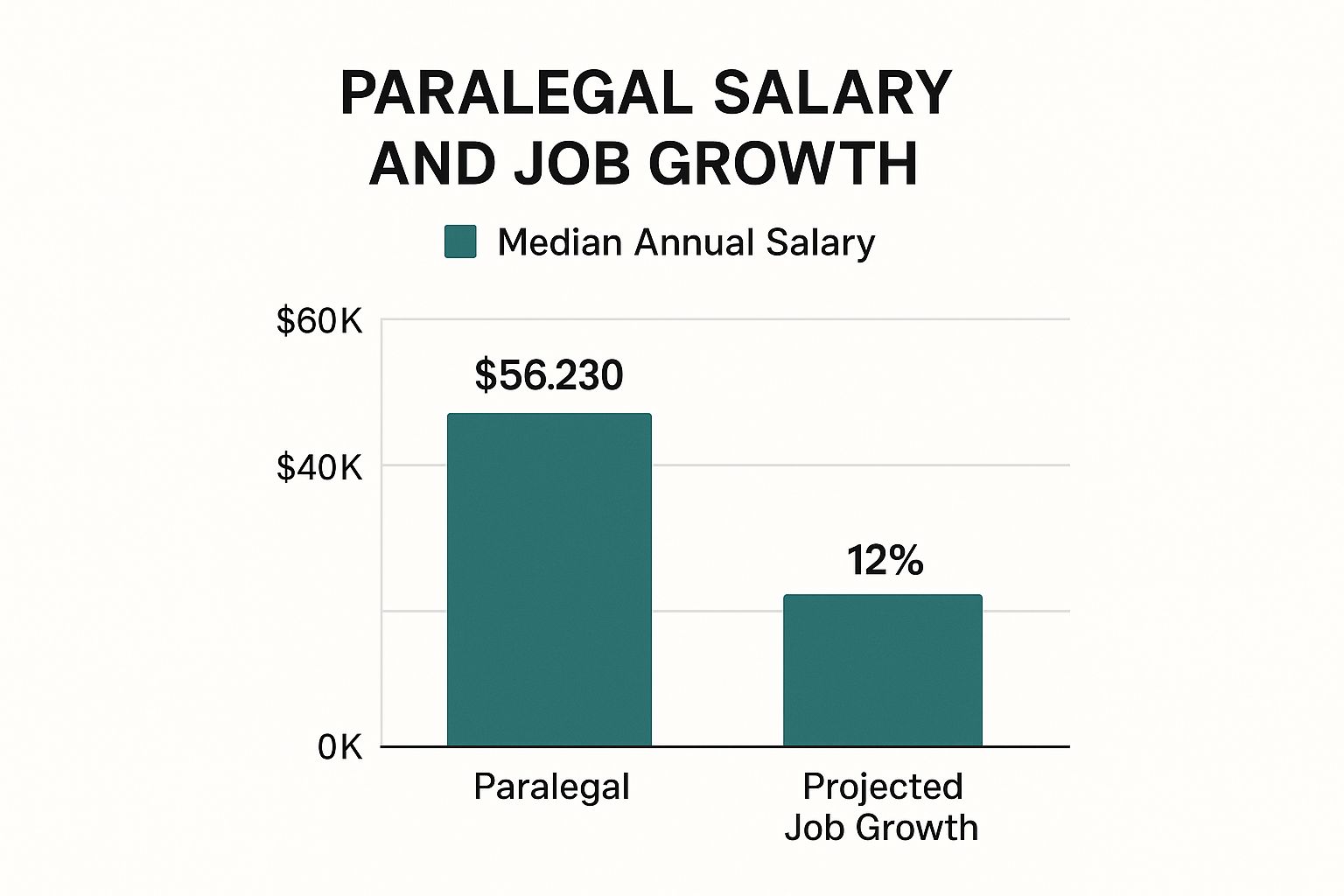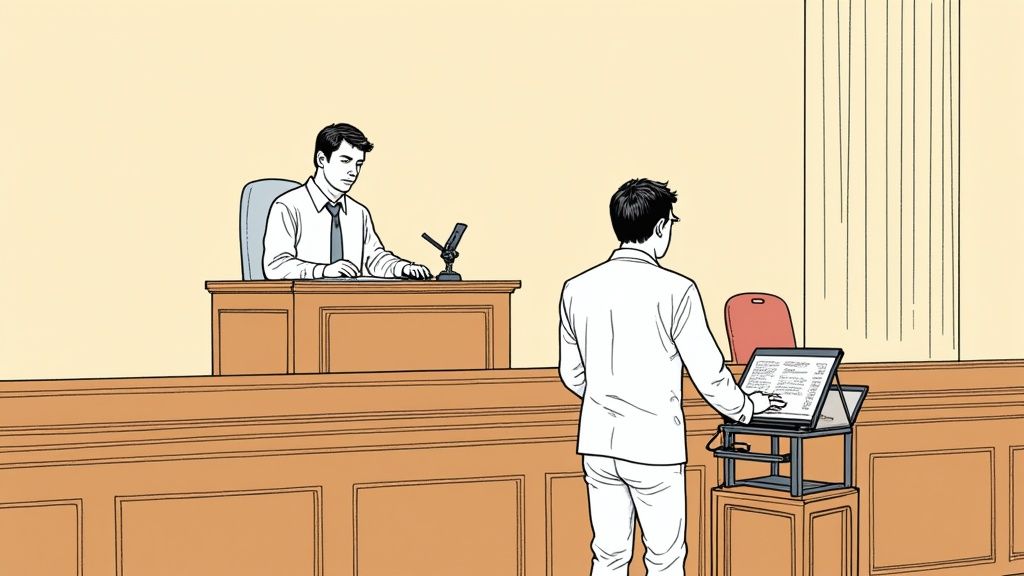
 17 minutes read
17 minutes read
So you think the legal world is a gilded cage, accessible only to those who survive three years of law school and mortgage their future for a Juris Doctor? I get it. The perception is that without that fancy degree, you're stuck on the outside looking in. But as someone who's built a business finding elite legal talent, let me tell you—that’s a myth. Turns out there’s more than one way to build a lucrative career in law without mortgaging your office ping-pong table for tuition.
The legal industry is a massive machine, and the attorneys are just one part of it. The real engine room? It's powered by brilliant specialists who never set foot in a constitutional law lecture but are absolutely essential to winning cases. If you're sharp, driven, and meticulously detail-oriented, you have a place here, and it's a valuable one. This isn't about finding a "back door" into the legal field; it's about walking straight through the front door of a different, equally critical wing of the building. We're going to break down the top law jobs without a law degree that offer serious paychecks and real impact, minus the soul-crushing student debt. Let's get to it.
Let's get one thing straight: a great paralegal is less of an 'assistant' and more of a force multiplier. They are the tactical backbone of any successful legal team, handling the substantive work that keeps cases moving forward. While attorneys strategize, paralegals execute—drafting documents, digging through discovery, and managing case files with military precision.
Hope you enjoy being indispensable, because that’s your new full-time job. It’s one of the most direct law jobs without a law degree that puts you right in the center of the action. You’re not just filing paperwork; you are actively involved in the legal process from start to finish.
A paralegal's duties vary wildly depending on the practice area, but the core function remains the same: perform substantive legal work under an attorney's supervision. You could be a corporate paralegal helping prepare for a billion-dollar merger or a criminal defense paralegal organizing evidence for a high-stakes trial.
Other examples include:
This field is not only in demand but also offers a solid career trajectory. The following chart visualizes the strong financial and growth prospects for paralegals, according to the U.S. Bureau of Labor Statistics.

The data clearly shows that the paralegal profession is expanding much faster than the average for all occupations, signaling robust and sustained demand for skilled professionals.
To set yourself up for success, consider these actionable steps:
Think you can type fast? A court reporter’s speed and accuracy would make your head spin. They are the official keepers of the spoken word in legal proceedings, creating a flawless, verbatim transcript that serves as the one and only official record. Without them, appeals would be impossible and the entire justice system would grind to a halt.
Forget being a fly on the wall; you are the wall. Your work is the foundation upon which legal arguments are built, challenged, and reviewed. This is one of the most specialized law jobs without a law degree, requiring a unique blend of technical skill, intense focus, and unwavering impartiality. You’re not just typing; you're preserving the integrity of the legal process one syllable at a time.

At its core, a court reporter’s job is to capture every spoken word during a legal proceeding using a stenotype machine. This requires typing at speeds exceeding 225 words per minute. But the role extends far beyond the courtroom.
Other examples include:
This is a field where skill, not just a degree, dictates success. The demand for reporters who can provide instant, accurate transcripts is high, creating a stable and rewarding career path. The meticulous nature of the work often translates into significant earning potential.
To position yourself at the top of the field, focus on these critical steps:
If a paralegal is the tactical backbone, the legal secretary is the central nervous system of a legal practice. Forget the outdated "secretary" stereotype; these professionals are master orchestrators who ensure the entire operation runs without a hitch. They are the gatekeepers of information, the schedulers of critical deadlines, and the communication hubs that connect attorneys, clients, and the courts.
Don’t mistake this role for simple administrative work. A top-tier legal secretary anticipates an attorney's needs before they even ask, manages complex calendars with the precision of an air traffic controller, and handles client communications with empathy and professionalism. This is one of the most essential law jobs without a law degree for those who thrive on organization and detail.

A legal secretary's responsibilities are foundational to the daily functions of a law office. They provide high-level administrative support, freeing up attorneys and paralegals to focus on substantive legal tasks. Their work is the grease in the gears that keeps the entire legal machine moving.
Specific duties often include:
This role is a gateway into the legal world, offering a stable career path with opportunities for specialization and advancement. Honing the right skills is key to becoming an indispensable part of any legal team.
To position yourself for a successful career, focus on these concrete steps:
If attorneys are the generals planning the battle, legal investigators are the elite scouts operating behind enemy lines. They are the boots on the ground, tasked with digging up the facts, evidence, and intel that can make or break a case. Forget what you’ve seen in the movies; this isn’t about dramatic car chases. It’s about meticulous, patient, and clever fact-finding.
Think you have a knack for uncovering the truth? This is one of the most dynamic law jobs without a law degree, putting you at the very heart of case development. You’re not just reading reports; you’re creating them. Your work directly informs legal strategy, providing the raw material attorneys need to build a winning argument.
A legal investigator’s mission is to uncover and verify facts for litigation. This isn't a desk job. You'll be out in the field conducting interviews, locating hard-to-find witnesses, taking photographs, and serving subpoenas. Your findings are compiled into detailed reports that can become crucial evidence.
Examples of your missions, should you choose to accept them:
This career is less about formal education and more about having the right skillset: persistence, resourcefulness, and a healthy dose of skepticism. Many investigators come from law enforcement or military backgrounds, but it's not a prerequisite.
To get your foot in the door and build a reputation, focus on these steps:
If you enjoy being the person who knows the rules better than anyone else and saves companies from multi-million dollar fines, then welcome to compliance. A compliance officer isn't just a rule-enforcer; they are a strategic guardian, protecting the organization from the inside out by ensuring it plays by the ever-changing book of regulations.
Think of yourself as the company’s indispensable guide through a dense legal jungle. It’s one of the most vital law jobs without a law degree, placing you at the intersection of law, business, and ethics. You’re not just checking boxes; you’re building the very framework that allows a business to operate legally and ethically.
A compliance officer's mission is to ensure an organization adheres to all external regulations and internal policies. You’re the architect of the compliance program, conducting audits, training employees, and acting as the key liaison with regulatory agencies. Your work is proactive, designed to prevent violations before they ever happen.
Your daily tasks will shift based on the industry:
Demand for compliance professionals has exploded as regulatory landscapes become more complex. Organizations are desperate for skilled officers who can mitigate risk. This isn't just a job; it's a critical business function with significant career and financial upside.
To position yourself as a top candidate, focus on these strategic moves:
Forget dusty law books; the modern legal battlefield is digital, and the Legal Technology Specialist is its quartermaster. These are the people who bridge the ever-widening gap between legal practice and cutting-edge tech. While lawyers argue precedents, tech specialists ensure the e-discovery platform doesn't crash mid-review.
Think of yourself as the tech whisperer for a law firm. You're not just fixing the printer; you are implementing, managing, and optimizing the complex software that underpins every modern legal operation. It's one of the most critical law jobs without a law degree, especially as firms scramble to stay competitive in a tech-driven world.
A Legal Technology Specialist ensures the firm's tech stack is a strategic asset, not a liability. Their role is incredibly diverse, touching everything from data security to trial presentation. You might be an e-discovery guru for a massive litigation firm or the sole IT manager keeping a boutique practice running smoothly.
Other examples include:
This career path is perfect for the tech-savvy individual who finds the legal world fascinating but doesn't want to become an attorney. As the legal field becomes more reliant on technology, the demand for these roles is exploding. For more insight into this trend, explore remote law jobs and see how tech roles are shaping the industry.
To build a career at the intersection of law and technology, focus on these steps:
| Role | Implementation Complexity | Resource Requirements | Expected Outcomes | Ideal Use Cases | Key Advantages |
|---|---|---|---|---|---|
| Paralegal | Moderate training and certification | Associate degree or paralegal certificate | Legal research, document prep, case support | Support attorneys, case prep in various legal fields | Entry to legal field without law degree, specialization options |
| Court Reporter | High (stenography skill & certification) | Postsecondary certificate/associate degree + stenography equipment | Accurate verbatim transcripts, real-time transcription | Court proceedings, depositions, live captioning | High salary, flexible/freelance work, tech-forward role |
| Legal Secretary | Low to moderate | High school diploma + legal training | Administrative support, scheduling, document formatting | Law firm admin, client communication | Entry-level, stable employment, transferable admin skills |
| Legal Investigator | Moderate (fieldwork & research skills) | High school diploma + investigation training & license | Evidence gathering, witness interviews, investigative reports | Criminal, corporate, family law investigations | Independant fieldwork, varied daily tasks, good earning potential |
| Compliance Officer | High (regulatory knowledge, policy development) | Bachelor's degree + compliance certifications | Regulatory adherence, audits, training, risk management | Financial, healthcare, environmental, data privacy sectors | High salary, career advancement, industry-wide demand |
| Legal Technology Specialist | High (tech + legal knowledge) | Bachelor's degree in IT or related field | Manage legal software/systems, e-discovery, digital evidence handling | Law firms, litigation support, legal IT management | Cutting-edge tech exposure, strong salary, emerging career path |
There you have it. Six distinct, high-impact career paths into the legal world that don’t require you to sell your soul (or take out six figures in student loans) for a law degree. The message is clear: the legal field is a massive ecosystem, and lawyers are just one part of it. The real work, the day-to-day grind that keeps the wheels of justice turning, is often handled by these essential professionals.
For too long, a Juris Doctor degree has been seen as the only key to the kingdom. That’s an outdated, expensive, and frankly, inaccurate assumption. The modern legal landscape demands a diverse skill set that a traditional law school education doesn't always provide. Firms need tech wizards who can manage e-discovery platforms, meticulous investigators who can uncover the facts a lawyer might miss, and compliance experts who can navigate regulatory mazes. The demand for these law jobs without a law degree isn't just growing; it's exploding.
So, what's your next step? Don't just close this tab and go back to scrolling. It's time to take action.
For the law firms reading this, your takeaway is just as urgent. Stop limiting your talent pool. Hope you enjoy spending your afternoons fact-checking resumes and running technical interviews—because that’s now your full-time job if you stick to the old hiring playbook. Your next crucial hire might just be a legal professional without a law degree.
The gatekeepers are gone. It's no longer about where you went to school, but what you can do.
Ready to find that specialized talent without the hiring headache? HireParalegals connects you with a pre-vetted network of elite, remote legal support professionals, from paralegals to legal tech specialists. Stop searching and start building your dream team today at HireParalegals.